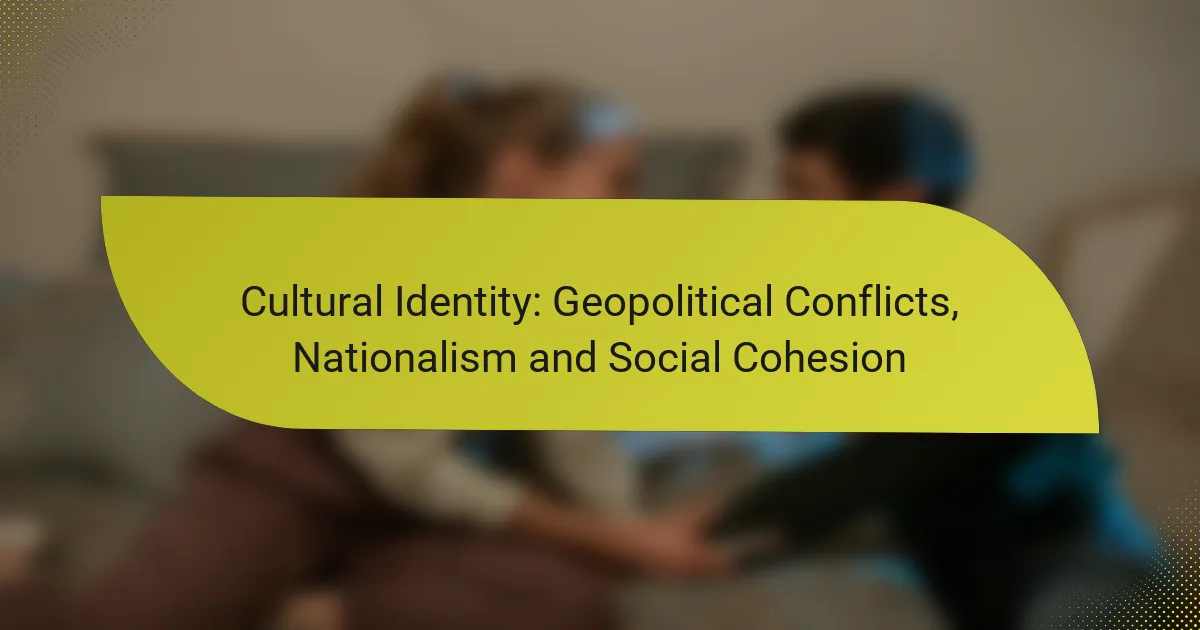Cultural identity is a crucial factor in understanding geopolitical conflicts, as it shapes national interests and influences group dynamics. The interplay between nationalism and social cohesion can either unite communities through shared identities or exacerbate tensions when cultural identities clash. Recognizing and valuing diverse cultural backgrounds is essential for fostering dialogue and promoting peace in conflict-prone regions.
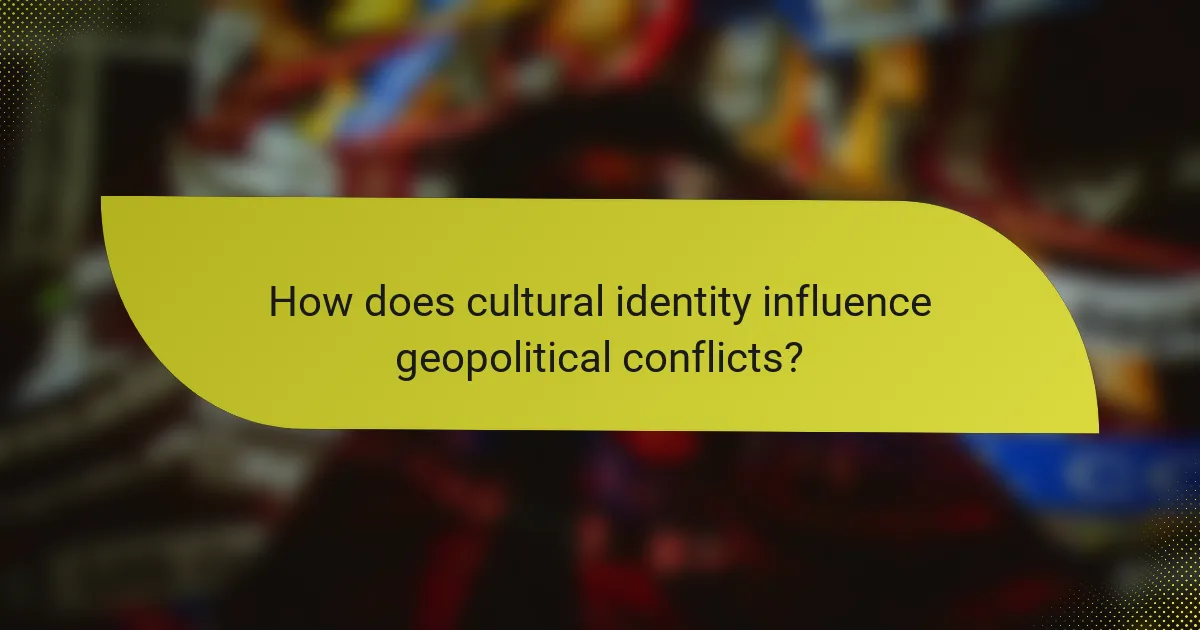
How does cultural identity influence geopolitical conflicts?
Cultural identity plays a significant role in shaping geopolitical conflicts by influencing national interests, group dynamics, and social cohesion. When cultural identities clash, they can lead to tensions that escalate into broader conflicts, affecting regional stability and international relations.
Historical context of cultural identity
The historical context of cultural identity is crucial in understanding its influence on geopolitical conflicts. Many conflicts are rooted in historical grievances, territorial claims, or the legacy of colonialism, where cultural identities have been suppressed or marginalized. For instance, the Balkans have a complex history of ethnic tensions that continue to influence current conflicts.
Additionally, the formation of nation-states often disregarded existing cultural identities, leading to artificial boundaries that group disparate communities together. This can create friction, as seen in regions like the Middle East, where borders drawn during colonial times do not reflect the cultural and ethnic realities on the ground.
Case studies of recent conflicts
Recent conflicts illustrate how cultural identity can ignite geopolitical tensions. The Syrian Civil War, for example, involves various ethnic and religious groups whose identities have shaped their allegiances and motivations. The conflict has not only been about political power but also about cultural survival and identity preservation.
Another example is the ongoing tensions in Ukraine, where cultural identity plays a pivotal role in the conflict between pro-Russian and pro-European factions. The division between Russian-speaking and Ukrainian-speaking populations has fueled nationalistic sentiments, complicating efforts for peace and reconciliation.
Impact on international relations
Cultural identity significantly impacts international relations by influencing how countries interact and align with one another. Nations often form alliances based on shared cultural or historical ties, which can lead to geopolitical blocs that reflect these identities. For instance, the European Union has been shaped by a shared cultural identity among member states, fostering cooperation and integration.
Conversely, cultural conflicts can lead to isolation and hostility. Countries may impose sanctions or engage in diplomatic standoffs when cultural identities clash, as seen in the strained relations between Western nations and Russia following the annexation of Crimea. Understanding these dynamics is essential for policymakers aiming to navigate complex international landscapes.
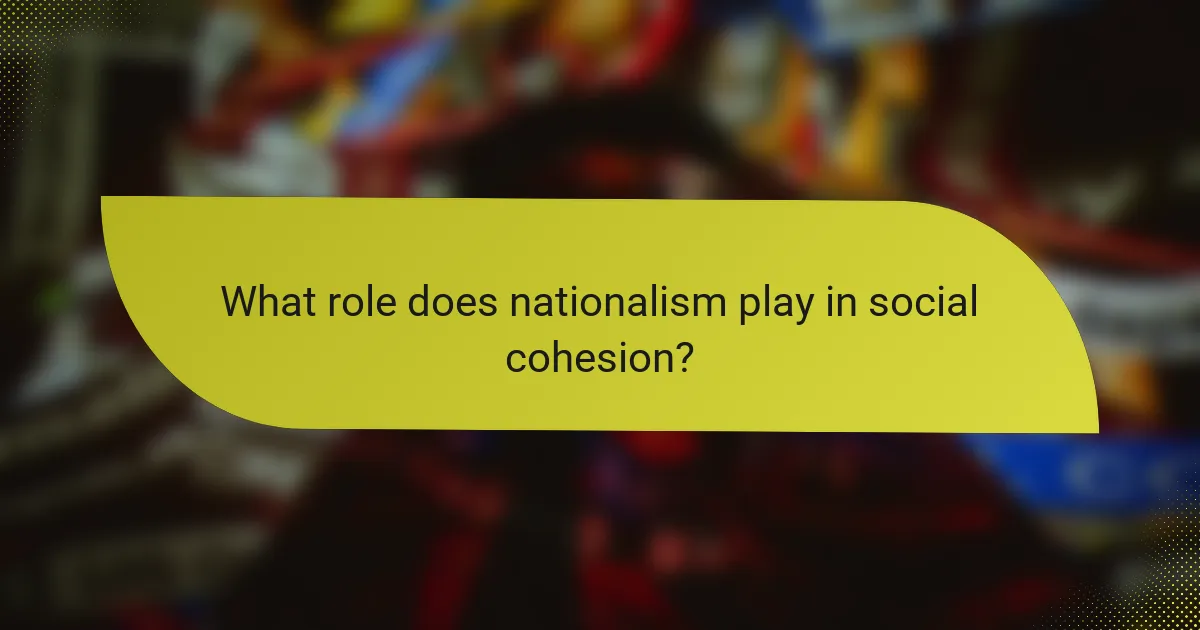
What role does nationalism play in social cohesion?
Nationalism can significantly enhance social cohesion by fostering a sense of belonging and shared identity among individuals within a nation. It promotes unity through common cultural, historical, and linguistic ties, which can strengthen community bonds and collective purpose.
Nationalism as a unifying force
Nationalism acts as a unifying force by creating a shared identity that transcends individual differences. It encourages individuals to identify with their nation, leading to a collective mindset that prioritizes national interests over personal or regional affiliations.
This sense of unity can manifest in various forms, such as national celebrations, symbols, and narratives that reinforce a common heritage. When people feel connected to their nation, they are more likely to engage in cooperative behaviors that enhance social stability.
Examples of nationalism fostering community
Nationalism has historically fostered community through events such as Independence Day celebrations, where citizens come together to commemorate their shared history and values. These gatherings often strengthen local ties and promote a sense of pride in one’s nation.
Another example is the use of national sports teams to rally citizens around a common cause. Success in international competitions can boost national pride and solidarity, encouraging individuals to support one another and build a cohesive community.
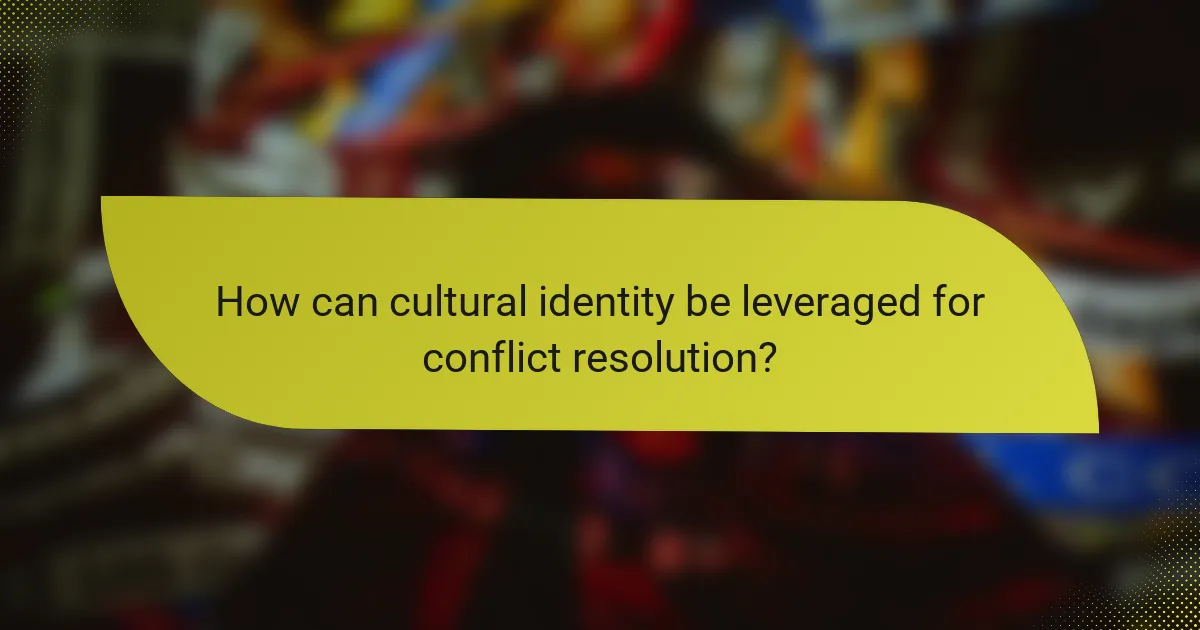
How can cultural identity be leveraged for conflict resolution?
Cultural identity can be a powerful tool for conflict resolution by fostering understanding and empathy among diverse groups. By recognizing and valuing different cultural backgrounds, stakeholders can create a more inclusive dialogue that addresses underlying tensions and promotes social cohesion.
Dialogue initiatives in diverse societies
Dialogue initiatives aim to bring together individuals from various cultural backgrounds to discuss their differences and commonalities. These initiatives often involve structured conversations, workshops, or community forums that encourage participants to share their experiences and perspectives. Effective dialogue can lead to greater mutual respect and a shared commitment to peaceful coexistence.
For example, programs like the “Intercultural Dialogue” in Europe have successfully engaged communities in discussions that highlight cultural heritage while addressing conflicts. Such initiatives typically involve local leaders, NGOs, and community members to ensure broad representation and inclusivity.
Cultural diplomacy examples
Cultural diplomacy involves using cultural exchanges and initiatives to improve international relations and resolve conflicts. This can include art exhibitions, music festivals, or educational programs that showcase the richness of different cultures. By promoting cultural understanding, nations can build bridges that reduce tensions and foster collaboration.
One notable example is the U.S. State Department’s “Cultural Envoy” program, which sends artists and cultural figures abroad to engage with local communities. These exchanges not only highlight American culture but also encourage dialogue and understanding between nations, helping to mitigate conflicts through shared cultural experiences.

What are the challenges of multiculturalism in national identity?
Multiculturalism presents significant challenges to national identity by creating tensions between diverse cultural groups and the dominant national narrative. These challenges often manifest in social cohesion issues, where differing values and beliefs can lead to conflict and fragmentation within society.
Case studies of multicultural tensions
One prominent example is the situation in Belgium, where linguistic and cultural divisions between the Flemish and Walloon communities have led to political instability and social strife. Similarly, in Canada, the tensions between English and French-speaking populations have historically influenced national policies and identity debates.
Another case is the United States, where racial and ethnic diversity has sparked discussions around immigration, identity, and social justice. These tensions often highlight the struggle for representation and the challenge of integrating multiple identities into a cohesive national framework.
Policy implications for governance
Governments must navigate multiculturalism carefully to foster social cohesion while respecting cultural diversity. Effective policies may include promoting inclusive education that emphasizes shared values while recognizing differences, as well as implementing anti-discrimination laws to protect minority rights.
Additionally, engaging in dialogue with various cultural groups can help build trust and understanding. Policymakers should consider participatory governance models that allow for the representation of diverse voices, ensuring that all communities feel valued in the national identity narrative.
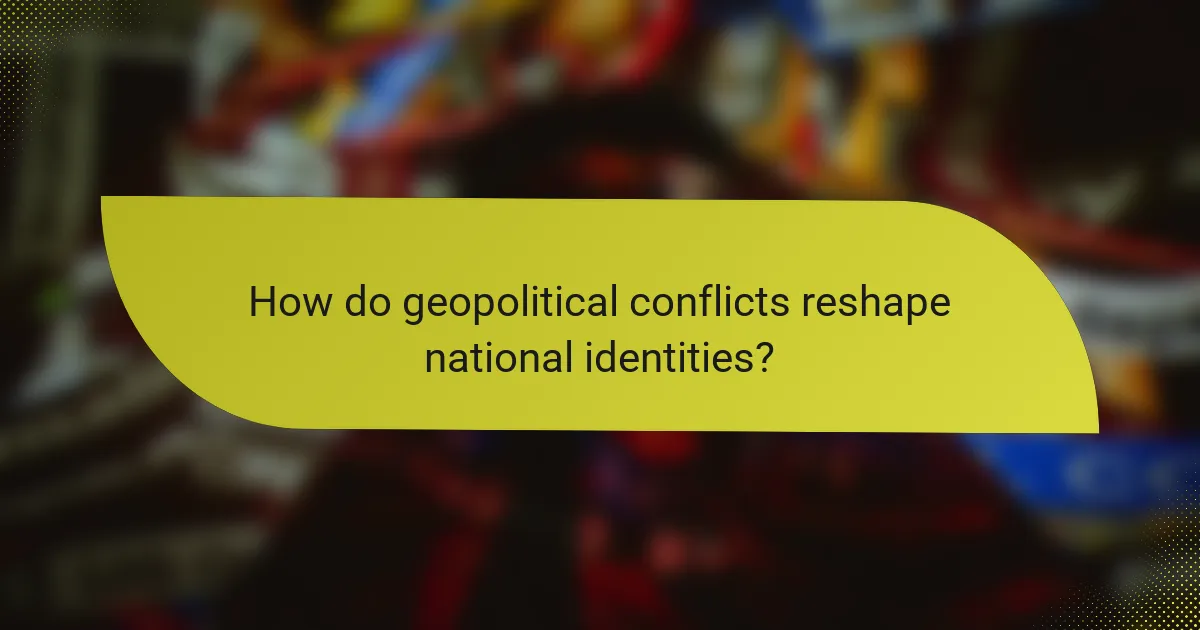
How do geopolitical conflicts reshape national identities?
Geopolitical conflicts significantly alter national identities by influencing how groups perceive themselves and their place in the world. These conflicts can lead to a redefinition of cultural values, social norms, and collective memories, often fostering a sense of unity or division among populations.
Transformations in identity during conflicts
During conflicts, national identities often undergo profound transformations as communities rally around shared experiences and narratives. This can manifest in increased nationalism, where individuals emphasize their cultural heritage and collective history in response to external threats. For instance, in regions experiencing territorial disputes, citizens may adopt more pronounced national symbols and language to assert their identity.
Additionally, conflicts can create divisions within societies, leading to the emergence of sub-identities based on ethnicity, religion, or political beliefs. These divisions can complicate social cohesion, as different groups may feel alienated or marginalized, impacting their sense of belonging within the nation.
Post-conflict identity reconstruction
After a conflict, nations often face the challenge of reconstructing their identities to promote healing and unity. This process may involve reconciliation efforts, where former adversaries engage in dialogue to address grievances and build mutual understanding. Countries like South Africa have implemented truth and reconciliation commissions to facilitate this healing process.
Moreover, post-conflict identity reconstruction can include redefining national narratives to incorporate diverse perspectives, fostering a more inclusive sense of identity. Governments may also invest in cultural initiatives that celebrate unity and diversity, helping to bridge divides and promote social cohesion in the aftermath of conflict.

What frameworks exist for understanding cultural identity?
Frameworks for understanding cultural identity include various models and comparative approaches that help analyze how cultural identities are formed and expressed. These frameworks consider factors such as history, geography, and social dynamics, providing insights into the complexities of cultural identity in different contexts.
Models of cultural identity
Models of cultural identity often focus on the interplay between individual and collective identities. One common model is the social identity theory, which posits that a person’s self-concept is derived from their membership in social groups. This can include nationality, ethnicity, and other cultural affiliations.
Another model is the cultural identity development model, which outlines stages individuals may go through as they explore and affirm their cultural identities. This model emphasizes the importance of personal experiences and social interactions in shaping one’s cultural understanding.
Comparative frameworks across regions
Comparative frameworks for cultural identity examine how different regions approach identity formation. For instance, Western countries often emphasize individualism, while many Eastern cultures may prioritize collectivism. This distinction influences how cultural identity is perceived and expressed in various societies.
Additionally, frameworks like the intercultural sensitivity model highlight the importance of understanding cultural differences in communication styles and values. This model can be particularly useful in multicultural settings, where awareness of diverse cultural identities fosters social cohesion and reduces conflict.
